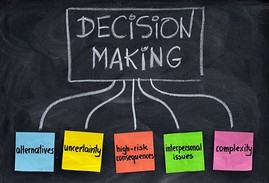 One of the enduring challenges that directors face every time they meet together as a board concerns decision-making. How do directors make smart decisions when 1). they often lack crucial information, and 2). the environment is fundamentally both complex and dynamic? The answer lies in the group of directors' (the board's) ability to make decisions, as one. Why so? Legally, the board is a collective of directors. Individual directors make contributions to discussions and debates, but not decisions. It is the board that makes decisions. This transition—from the singular (individual directors, contributions, inputs) to the collective (the board as one whole, decisions, outputs)—occurs when directors meet (i.e., in board meetings, when the board is in session). If the transition is to occur well, all of the directors must be actively engaged their work—working together towards the decision, as one. Group decisions are much harder to make than individual decisions. Reaching agreement can be a minefield, especially if information is missing, trust is low or if directors are more interested (sometimes covertly) in pursuing multiple agendas or representing constituencies rather than acting the best interests of the company (as the law requires). How can boards get past this challenge, to make effective decisions on a reasonably consistent basis? Recently, CGMA (Chartered Global Management Accountant, a joint-venture between AICPA and CIMA) tackled this question head on. Their report has just been released. You can read a copy of the executive summary here, or the full report here. The authors make eight key recommendations for effective group decision-making:
I commend this report to you, especially if effective decision-making has been a challenge for your board over the past year or so. Share it with your board colleagues and ask the chairman to schedule a discussion at an upcoming board meeting. If nothing else, you'll bring the expectation of effective decision-making out into the open. Or, the board may find that some behaviours or expectations need to be adjusted, and that a formal board review is appropriate. The discussion may also expose some larger but hitherto hidden issues including that the board may not be clear on the purpose or the strategy of the organisation. If this is discovered, some external advice and assistance may be in order. Regardless of the discussion and the outcome, I suspect it will time well spent.
0 Comments
Leave a Reply. |
SearchMusingsThoughts on corporate governance, strategy and boardcraft; our place in the world; and other topics that catch my attention. Categories
All
Archives
May 2024
|
|
Dr. Peter Crow, CMInstD
|
© Copyright 2001-2024 | Terms of use & privacy
|

